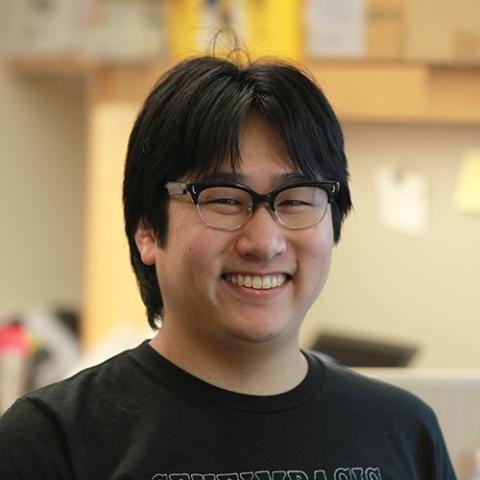Research
The formation and maintenance of long-term memories for episodes and spaces are vital for daily life. The goal of our laboratory is to provide a biophysically-based mechanistic understanding of the neural process for learning and memory in the mouse brain by linking the elementary information processing and representation mechanisms of individual neurons and their microcircuits to animal behaviors in the entorhinal cortical hippocampal network. We also try to understand how learning and memory processing is impaired under psychotic conditions. To address these questions, we will examine neural circuit mechanisms for the behavior-dependent optimization of the brain’s spatiotemporal metrics by using mouse circuit genetics, retrograde trans-synaptic tracing, in vivo calcium imaging, electrophysiology in vivo and in vitro, and circuits/cell-type specific activity manipulating analysis.
Meet the Principal Investigator

Takashi Kitamura, Ph.D., Associate Professor
Dr. Kitamura graduated with a bachelor's degree in Biology from Kyushu University in Japan. He obtained his Ph.D. in Biology at Kyushu University, where he studied molecular mechanisms and the functional role of adult hippocampal neurogenesis in rodent brains. After a Post-Doc at Mitsubishi-Kagaku institute of life science in Tokyo, Japan, and as an Assistant Professor at Toyama University in Japan, he conducted neural circuits genetics as a Research Scientist at the Picower Institute for Learning and Memory at MIT, where he applied techniques of advanced mouse genetics, cell-type specific neural tracing, in vivo calcium imaging, in vivo, and in vitro electrophysiology, and optogenetic manipulation techniques to understand how episodic memory is formed and stored in the brain. Dr. Kitamura joined the faculty in the Department of Psychiatry in 2017.
Hippocampal-amygdala memory circuits govern experience-dependent observational fear.
Terranova JI, Yokose J, Osanai H, Marks WD, Yamamoto J, Ogawa SK, Kitamura T, 2022 Feb NeuronThe role of engram cells in the systems consolidation of memory.
Tonegawa S, Morrissey MD, Kitamura T 2018 Jul Nat. Rev. Neurosci.Engrams and circuits crucial for systems consolidation of a memory.
Kitamura T, Ogawa SK, Roy DS, Okuyama T, Morrissey MD, Smith LM, Redondo RL, Tonegawa S 2017 Apr Science 6333 356 73-78Adult neurogenesis modulates the hippocampus-dependent period of associative fear memory.
Kitamura T, Saitoh Y, Takashima N, Murayama A, Niibori Y, Ageta H, Sekiguchi M, Sugiyama H, Inokuchi K 2009 Nov Cell 4 139 814-27Outer layer of Vb neurons in medial entorhinal cortex project to hippocampal dentate gyrus in mice.
Yamamoto N, Yokose J, Ramesh K, Kitamura T, Ogawa SK, 2024 Feb Mol Brain 1 17 5Neuronal Ensembles Organize Activity to Generate Contextual Memory.
Marks WD, Yokose J, Kitamura T, Ogawa SK, 2022 Front Behav Neurosci 16 805132Entorhinal cortical Island cells regulate temporal association learning with long trace period.
Yokose J, Marks WD, Yamamoto N, Ogawa SK, Kitamura T, 2021 09 Learn Mem 9 28 319-328Cell-Type-Specific Optogenetic Techniques Reveal Neural Circuits Crucial for Episodic Memories.
Yamamoto N, Marks WD, Kitamura T, 2021 Adv Exp Med Biol 1293 429-447Adult hippocampal neurogenesis for systems consolidation of memory.
Terranova JI, Ogawa SK, Kitamura T, 2019 Oct Behav. Brain Res. 372 112035Orchestrated ensemble activities constitute a hippocampal memory engram.
Ghandour K, Ohkawa N, Fung CCA, Asai H, Saitoh Y, Takekawa T, Okubo-Suzuki R, Soya S, Nishizono H, Matsuo M, Osanai M, Sato M, Ohkura M, Nakai J, Hayashi Y, Sakurai T, Kitamura T, Fukai T, Inokuchi K, 2019 06 Nat Commun 1 10 2637Driving and regulating temporal association learning coordinated by entorhinal-hippocampal network.
Kitamura T 2017 May Neurosci. Res.Distinct Neural Circuits for the Formation and Retrieval of Episodic Memories.
Roy DS, Kitamura T, Okuyama T, Ogawa SK, Sun C, Obata Y, Yoshiki A, Tonegawa S 2017 Aug Cell 5 170 1000-1012.e19Entorhinal Cortical Ocean Cells Encode Specific Contexts and Drive Context-Specific Fear Memory.
Kitamura T, Sun C, Martin J, Kitch LJ, Schnitzer MJ, Tonegawa S 2015 Sep Neuron 6 87 1317-31Entorhinal-hippocampal neuronal circuits bridge temporally discontiguous events.
Kitamura T, Macdonald CJ, Tonegawa S 2015 Sep Learn. Mem. 9 22 438-43Distinct speed dependence of entorhinal island and ocean cells, including respective grid cells.
Sun C, Kitamura T, Yamamoto J, Martin J, Pignatelli M, Kitch LJ, Schnitzer MJ, Tonegawa S 2015 Jul Proc. Natl. Acad. Sci. U.S.A. 30 112 9466-71Differential roles of the dopamine 1-class receptors, D1R and D5R, in hippocampal dependent memory.
Sariñana J, Kitamura T, Künzler P, Sultzman L, Tonegawa S 2014 Jun Proc. Natl. Acad. Sci. U.S.A. 22 111 8245-50Cell type-specific genetic and optogenetic tools reveal hippocampal CA2 circuits.
Kohara K, Pignatelli M, Rivest AJ, Jung HY, Kitamura T, Suh J, Frank D, Kajikawa K, Mise N, Obata Y, Wickersham IR, Tonegawa S 2014 Feb Nat. Neurosci. 2 17 269-79Role of adult neurogenesis in hippocampal-cortical memory consolidation.
Kitamura T, Inokuchi K 2014 Feb Mol Brain 7 13Hippocampal function is not required for the precision of remote place memory.
Kitamura T, Okubo-Suzuki R, Takashima N, Murayama A, Hino T, Nishizono H, Kida S, Inokuchi K 2012 Feb Mol Brain 5 5Comprehensive behavioural study of GluR4 knockout mice: implication in cognitive function.
Sagata N, Iwaki A, Aramaki T, Takao K, Kura S, Tsuzuki T, Kawakami R, Ito I, Kitamura T, Sugiyama H, Miyakawa T, Fukumaki Y 2010 Nov Genes Brain Behav. 8 9 899-909Running wheel exercises accelerate neuronal turnover in mouse dentate gyrus.
Kitamura T, Sugiyama H 2006 Sep Neurosci. Res. 1 56 45-52Lab Alumni
Norimichi Ito, Ph.D., Assistant Professor, Nagoya University, Japan
Ryang Kim, Ph.D., Assistant Professor, University of Tokyo, Japan
Joseph Terranova, Ph.D., Assistant Professor at Midwestern University
William Marks, Ph.D., Assistant Professor of Instruction at University of Texas Dallas